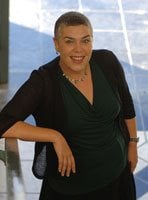
Elaine Rumboll, Director of Executive Education at the UCT GSB.
Music, storytelling and movement all play an innovative role in this unique learning offering. The first course of its kind to be run at a business school in South Africa, it was conceived by the UCT GSB’s Executive Education unit and constructed by a collaborative team.
Teams are a fundamental feature of the organisational landscape. However, research has shown that while teams have the potential to deliver better performance than individuals, they seldom realise this potential. Finding ways to motivate and develop teams and team leaders is a critical challenge.
The course, Creative Tools for Optimising Team Performance, will equip team leaders with an understanding of team creativity and build the tools needed to access this creativity. The model combines both conceptual and experiential components with the development of practical, hands-on skills.
According to Elaine Rumboll Director of Executive Education at the UCT GSB, the programme borrows extensively from the creative arts because this can produce fresh and inventive ways of operating within organisations.
“As Nancy J. Adler of McGill University says in her essay, ‘The Arts & Leadership: Now That We Can Do Anything, What Will We Do?’, 21st-century organisations need to engage in new, more spontaneous, and more innovative ways of managing. Designing innovative options requires more than the traditional analytical and decision-making skills - it requires skills that creative artists have used for years,” said Rumboll.
This is something which business schools and companies, including Wharton and the Harvard Business School, are increasingly recognising.
“Most forms of creative expression, be it music, art, poetry, movement or drama, have in common certain basic tools – discipline, the ability to listen and observe, the capability to contribute appropriately, the skill to problem-solve,” said Rumboll. “Importantly, the creative process is a social process.”
It is these tools which, when translated into an organisational environment, can provide the means to unlock the immense potential inherent in teams and team work.
The new UCT GSB course encourages mindfulness, creative expression and reflection within a facilitated environment to develop relevant tools and solutions. The programme has been co-created, and will be facilitated, by an experienced team of learning practitioners who have specialist skills in a range of creative arts methodologies. These include ceramics, performing arts, music, movement, story telling and poetry.
Organisational development consultant, musician and storyteller Philippa Kabali Kagwa says that the creative process is applicable to most work contexts. “If you listen to a multiple-voice choir, you hear a team of people working together towards a common goal. The principles involved are the same, be it business or the arts.”
The programme has a multifaceted design which is intended to engage learning on several levels, explained organisational development consultant Liz de Wet.
“It aims to equip individuals with the foundations of self awareness that are the essential starting point of effective leadership. It also offers delegates practical experiences of both leading and participating in teams, and creates opportunity for rigorous reflection on these experiences, and it provides a range of practical tools that delegates can take away and utilise in their own team contexts.”
“The convergence of business and the creative arts is not as curious as it may initially seem to some,” said Rumboll. “If one considers the complex choreography of a dance piece or the interplay of musicians within a jazz band, once can easily recognise the effectiveness of team work in the creation of something much bigger than the individuals involved. There is an undeniable elegance in both the process and the result.”
“It begs the question: is the work environment, with its ever-increasing reliance on the performance of teams, so very different?”
Creative Tools for Optimising Team Performance will be a three-day experiential learning process in May designed for team leaders of teams at any stage of their organisational or project-related lifecycle. The organisational team involved are Elaine Rumboll, Philippa Kabali-Kagwa, Liz de Wet and Lisa Firer.
Firer is one of South Africa’s best known ceramic artists and teachers with work in permanent collections at the South African Cultural History Museum and the George VI Gallery, Port Elizabeth.
For more information contact Dudu Mahlangu on (021) 406 1268 or . The course website is www.gsb.uct.ac.za/creativeteams.
